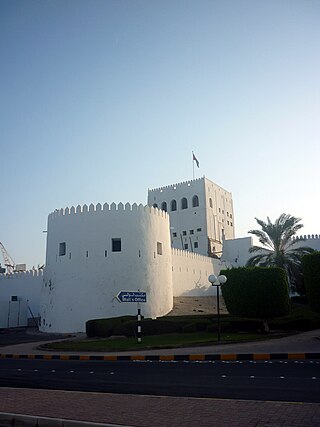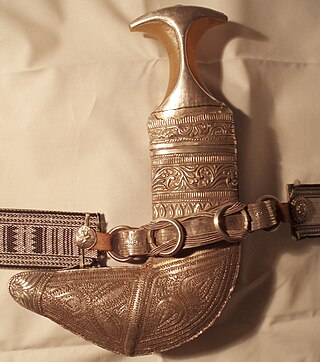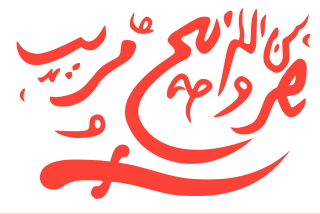Dema Wa Thaieen دماء والطائيين | |
|---|---|
Wilayat | |
| Coordinates: 23°02′02″N58°30′32″E / 23.034°N 58.509°E | |
| Country | Oman |
| Governorate | Ash Sharqiyah North |

Dema Wa Thaieen is a Wilayat of Ash Sharqiyah North in the Sultanate of Oman. [1] [2]
Dema Wa Thaieen دماء والطائيين | |
|---|---|
Wilayat | |
| Coordinates: 23°02′02″N58°30′32″E / 23.034°N 58.509°E | |
| Country | Oman |
| Governorate | Ash Sharqiyah North |

Dema Wa Thaieen is a Wilayat of Ash Sharqiyah North in the Sultanate of Oman. [1] [2]

Oman, officially the Sultanate of Oman, is a country in Arabia. It is located on the southeastern coast of the Arabian Peninsula, and overlooks the mouth of the Persian Gulf. It shares land borders with Saudi Arabia, the United Arab Emirates, and Yemen, while sharing maritime borders with Iran and Pakistan. The capital and largest city is Muscat. Oman has a population of nearly 4.7 million and is the 124th most-populous country. The coast faces the Arabian Sea on the southeast, and the Gulf of Oman on the northeast. The Madha and Musandam exclaves are surrounded by United Arab Emirates on their land borders, with the Strait of Hormuz and the Gulf of Oman forming Musandam's coastal boundaries.

Oman is a country on the southeast coast of the Arabian Peninsula, situated in West Asia, bordering the Arabian Sea, Gulf of Oman, and Persian Gulf, between Yemen and the United Arab Emirates (UAE). The coast of Oman was an important part in the Omani empire and sultanate.

When Sultan Qaboos bin Said Al Said assumed power in 1970, Oman had limited contacts with the outside world, including neighbouring Arab states. A special treaty relationship permitted the United Kingdom close involvement in Oman's civil and military affairs. Ties with the United Kingdom remained very close throughout Sultan Qaboos' reign, along with strong ties to the United States.

"as-Salâm as-Solṭâni" is the national anthem of the Sultanate of Oman. It is an ode originally dedicated to Qaboos bin Said (1940–2020), the former Sultan of Oman.

Islam is the state religion in Oman, introduced during the Prophet Muhammad's lifetime in the early 7th century. Muhammad appointed Amr ibn al-As as governor, who remained until Muhammad's death in 632 CE. Amr and Sa'id ibn Aws al-Ansari delivered Muhammad's letter to the Al-Julanda brothers; the rulers of Oman, inviting them to embrace Islam. This peaceful mission marked the beginning of Islam in Oman. Today, 85.9% of Oman's population is Muslim, with slightly over 45% following Sunni Islam, and around 45% Ibadi Islam, with the other 5% identifying as Shia Muslims.

Sohar is the capital and largest city of the Al Batinah North Governorate in Oman. An ancient capital of the country that once served as an important Islamic port town on the Gulf of Oman, Sohar has also been credited as the mythical birthplace of Sinbad the Sailor. It was historically known as Mazūn (مَزُوْن).

The Sultanate of Muscat and Oman, also known briefly as the State of Muscat and Oman during the rule of Taimur bin Feisal, was a sovereign state that encompassed the present-day Sultanate of Oman and parts of present-day United Arab Emirates and Pakistan, in the second half of the 19th century and 20th century. Ruled by the Busaid dynasty, it was established as a result of the partition of the Omani Empire upon the death of its last ruler Said bin Sultan. The Sultanate transitioned into a new form of government after the palace coup of 23 July 1970 in which the sultan Said bin Taimur was immediately deposed in favor of his son Qaboos bin Said.

The administrative division of Oman contains eleven governorates (muhafazah):

A khanjar is a traditional dagger originating from the Sultanate of Oman, although it has since spread to the rest of the Middle East and the Balkans. Worn by men for ceremonial occasions, it is a short curved blade shaped like the letter "J" and resembles a hook.

The Imamate of Oman was a historical state within the Oman proper in the Hajar Mountains, part of the present-day Sultanate of Oman. The capital of the Imamate alternated historically between Rustaq and Nizwa. The Imamate's territory extended north to Ibri and south to the Alsharqiyah region and the Sharqiya Sands. The Imamate was bounded in the east by the Hajar Mountains and in the west by the Rub' al Khali desert. The Al Hajar Mountains separated the Imamate of Oman from Muscat and Oman. The elected Imam (ruler) resided in the capital, and Walis (governors) represented the Imamate in its different regions.

Women in Oman now pursue careers and professional training, moving from their previous and traditional role at home to the public sphere. In Oman, 17 October is celebrated every year as the Omani Women's Day with various pro-female events.

The Embassy of Oman in Washington, D.C. is the Sultanate of Oman's diplomatic mission to the United States. It is located at 2535 Belmont Road Northwest, Washington, D.C. in the Kalorama neighborhood.
The Jebel Akhdar War, also known as the Jebel Akhdar Rebellion or the Oman War, broke out in 1954 and again in 1957 in Oman, as an effort by the local Omanis in the interior of Oman led by their elected Imam, Ghalib al-Hinai, to protect the Imamate of Oman from the occupation plans of Said bin Taimur, sultan of Muscat and Oman, backed by the British government, who were eager to gain access to the oil wells in the interior lands of Oman. Sultan Said received direct financing to raise an armed force to occupy the Imamate of Oman from Iraq Petroleum Company (IPC), a consortium of oil companies that was majorly owned by what is known today as Royal Dutch Shell, Total, ExxonMobil and British Petroleum (BP); the latter was majority-owned by the British government.

The Foreign Ministry is the government body in the Sultanate of Oman responsible for organising and directing Oman's relations with other countries and with regional and international organisations.

Visitors to Oman must obtain a visa prior to travel unless they come from one of the visa-exempt countries.

Rakhyut is a Wilayat or province of Dhofar Governorate in the Sultanate of Oman.
Dhalkut is a wilayat or province of Dhofar Governorate in the Sultanate of Oman.
The COVID-19 pandemic in Oman was a part of the worldwide pandemic of coronavirus disease 2019 caused by severe acute respiratory syndrome coronavirus 2. The virus was confirmed to have reached Oman on 24 February 2020 when two citizens tested positive for COVID-19 after returning from Iran. As of 21 August 2021, the total number of cases registered in the sultanate is 300,914, of which 289,450 have recovered and 4,020 have died. Initially, the majority of the cases and deaths occurred in the expatriate community. By July 2020, as the pandemic entered its fourth month in the country, the majority of the cases and deaths had occurred among the citizens.